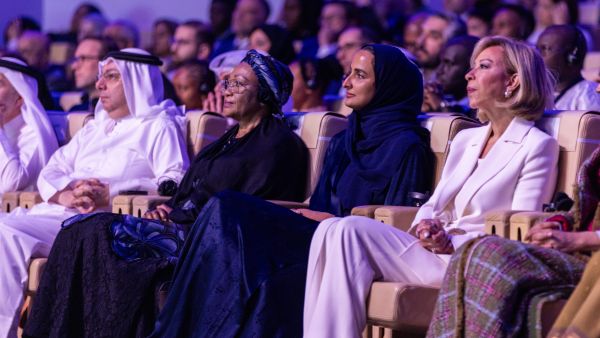WISE 12 Concludes with Bold Global Commitments to Human-Centered, Future-Ready Education

WISE 12 has concluded with powerful debates, global research launches, and collaborative high-level workshops tackling some of the most urgent challenges and opportunities in education, from AI readiness and digital well-being to culturally rooted learning and quantum innovation.
With leaders from governments, academia, civil society, and technology convening in Doha, the summit once again reinforced the role of WISE – a global initiative of Qatar Foundation – as the world’s leading platform for shaping the future of education.
As the day progressed, this broad global dialogue sharpened into a focused reflection on how systems can translate innovation into scalable, meaningful change. This was captured in the high-level Roundtable on ‘Scaling AI Tools for Impact’, which brought together Stavros Yiannouka, CEO of WISE; Nieves Segovia Bonet, President of SEK Education Group; Fernando Diaz del Castillo, Chief Learning Officer of Mentu; Jose Rafael Espinosa, Co-Founder and CEO of Mentu; Javier Gonzalez, CEO of SUMMA; and other global partners. Their discussions centered on the realities of AI tool adoption in ministries, the importance of data governance, and the need for teacher empowerment as AI tools rapidly enter formal and informal learning spaces.
This opened the door to broader reflections on the practical value of educational technology in strengthening teaching systems. Speakers emphasized how success depends on alignment with national curricula, building teacher trust, and adapting to the diverse realities of schools – reinforcing a consistent theme throughout the summit: innovation must remain anchored in the daily lived experience of educators and learners.
Building on this systemic perspective, WISE hosted the launch of the UNESCO and MoEHE Global Education Monitoring (GEM) Report. Presented by Dr. Asmaa Al Fadala, Director of Research and Content Development at WISE; Nofe Al-Suwaidi, Secretary General of the Qatar National Commission for Education, Culture, and Science; Manos Antoninis, Director of the Global Education Monitoring (GEM); and Dr. Khalid Al-Balushi, Senior Cultural Expert, Qatar National Committee for Education, Culture, and Science, the report offered new insights into global trends in inclusion, digital equity, resilience, and education financing.
“Empowering school leaders begins with respecting the diversity of their environments,” said Dr. Al Fadala. “The year-long program co-designed with the Ministry of Education and Higher Education, and Qatar Foundation schools, moves leaders from theory to applied practice, giving teachers the time and support they need to experiment confidently within a safe, collaborative space.”
Continuing this momentum, a session focusing on ‘Deep Tech and Quantum Computing’ examined how next-generation technologies will shape future learning economies. Panelists discussed how quantum-era skills, system readiness, and interdisciplinary education will define national competitiveness in the decades ahead.
“The jobs of the future won’t simply emerge on their own,” said Matthew Kam, Researcher at Google. “By applying a process to forecast those roles and then adjust the skills and knowledge base accordingly, we can begin training people today to build software, train small language-models and shape the AI infrastructure that tomorrow demands.
The discussion underscored the urgent need for new learning paradigms that keep pace with rapid technological change, especially as traditional pathways like K-12 and university education, and employer training, struggle to evolve at the required speed.
Discussions on future readiness continued into another session exploring AI as tools for educators, featuring Dr. Aikaterini Bagiati, Principal Research Scientist at MIT Open Learning; Elaine Matovu, Co-Founder of Northgreen School; and Dr. Margo Tripsa, Professional Learning Specialist at QF’s Education Development Institute.
Speakers discussed new data on teacher readiness, the efficacy of AI-powered professional development tools, and the risks of exacerbating inequalities without intentional design, with Dr. Tripsa saying: “Momentum isn’t sustained by courses alone; we need structure, leadership, and policy support.”
Adding regional depth to the day, the Arabic-language panel ‘Education in Conflict: Adaptation, Resistance, and Human Capital Development’, moderated by Aldana Alsemaitt, Programs Associate at WISE, shed light on community-led responses, resilience-building, and the urgent need for education systems capable of withstanding political and humanitarian disruption.
Bringing all these elements together, Nobel laureate Dr. Abhijit Banerjee delivered an inspiring keynote during the closing session of the summit that invited leaders to rethink how human capital is valued and measured in an era marked by inequality, disruption, and emergent technologies.
“The excitement we see today comes from a simple but transformative truth: all children can learn if we meet them where they are,” said Dr. Banerjee. “As we bring AI and new technologies into education, the real gains will come from getting the details right and designing tools that deepen learning rather than shortcut it.”
The closing session featured remarks by Stavros Yiannouka, CEO of WISE, and Dr. Asyia Kazmi, OBE, CEO Designate of WISE, who emphasized the interconnectedness of the summit’s themes – from deep tech to cultural identity – and reaffirmed a shared global commitment to building human-centered, equitable, and future-ready learning ecosystems.
In his final address as CEO of WISE, Stavros Yiannouka reflected on a summit that brought together thousands of participants across more than 150 sessions, saying: “Education must remain a deeply human endeavor, even as we introduce powerful new intelligence into our homes and classrooms. These tools must serve our values and support human flourishing.”
Dr. Kazmi also highlighted WISE’s expanding ecosystem – from global WISE research to the WISE Edtech Accelerator, and the teacher-led WISE Testbed Program – all designed to ensure that innovation remains human-centered, purposeful, and grounded in real-world impact.
“We are at a moment of great promise, but also great peril,” Dr. Kazmi concluded. “As digital advances accelerate, our responsibility is to ensure that innovation remains human-centered, and that the work we do between summits turns this promise into real progress for every learner.”
Background Information
Qatar Foundation
Qatar Foundation (QF) is a non-profit organization made up of more than 50 entities working in education, research, and community development.
Our unique ecosystem—supported by partnerships with leading international institutions—is built on initiatives that address our most pressing challenges, create global opportunities, and empower people to shape our present and future.






